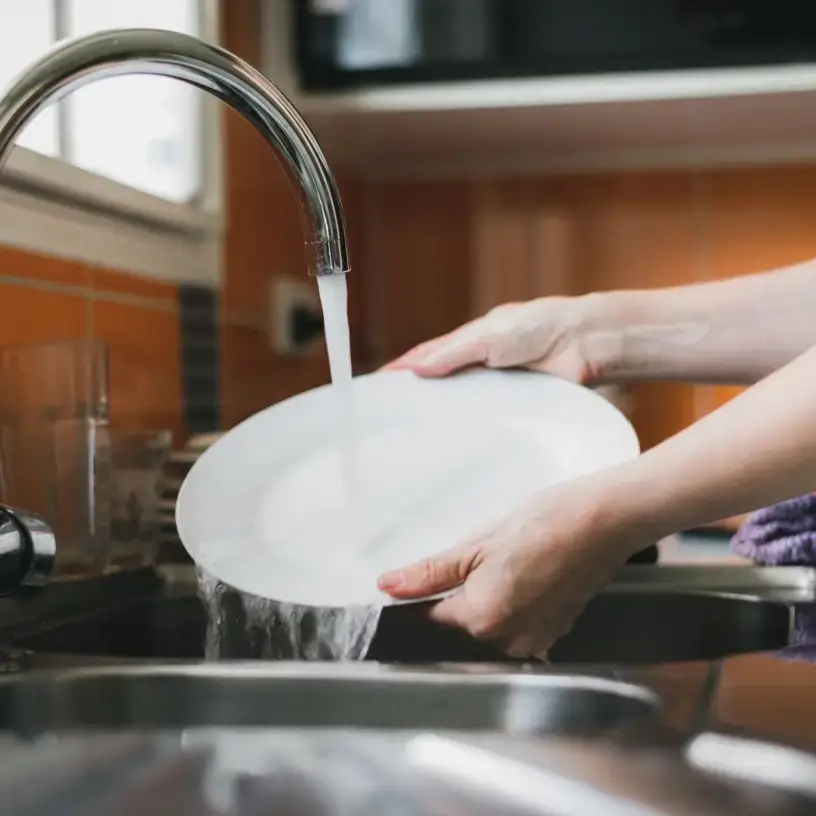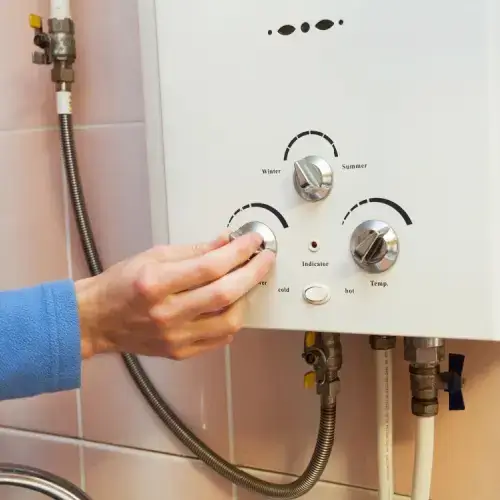Home / Compare Electricity & Ga… / Guide to the most effici…

Key takeaways
- Not all hot water systems are created equal. Water heating methods, reliability, energy efficiency, eco-friendliness and costs can vary from system to system.
- Consider a controlled load tariff. If you are replacing your current hot water system, a controlled load tariff paired with a storage hot water system may help you save on electricity bills.
- Check for concessions and rebates. Depending on whether you meet the criteria, you may be eligible for a rebate to get a more energy-efficient hot water system.
Expert tips for getting the most out of your hot water system
Our Head of Energy, Meredith O’Brien, has some top tips for helping you save money on your hot water system.

Deploy your boost setting on rainy days
If you have a solar hot water system, it may struggle to heat up on rainy or overcast days. However, you may be able to deploy the boost setting when more hot water might be required, which heats up supplementary water either through an electric or gas boosting system.
Plan ahead to save on energy costs
If your hot water system is on a controlled load meter set to an off-peak rate, schedule your dishwasher and washing machines to run late at night – especially if it’s on a hot water cycle setting. If possible, shower late at night or very early in the morning, too. However, if you have a solar hot water heater, it’s best to use appliances around midday when the sun is at its peak. Make sure your energy-heavy appliances are also the most energy efficient to further reduce costs.
Compare controlled load tariffs
By shopping around and comparing controlled load tariffs, you may be able to save money on your electricity bills. As costs vary between energy retailers (and some retailers will charge an additional daily supply charge for your controlled load), it’s important to regularly check what you’re currently paying (for both your controlled tariff and general electricity usage) against other plans to find the most suitable deal for your home.
Are storage or continuous/instantaneous water heaters more energy-efficient?
All hot water systems use one of two kinds of methods to heat water. A storage water heater heats and stores water in an insulated tank and provides an instant hot water service in large amounts. Alternatively, a continuous flow system (also known as an instantaneous system) uses electricity to heat water as needed. Therefore, continuous flow systems are generally more energy-efficient and cheaper to run but are smaller in size than storage units.
Types of hot water systems in Australia
According to the Australian government, there are four main types of hot water systems in the Australian market.1
Electric hot water systems
Electric hot water systems are usually more expensive than gas water heaters to run. However, electric storage systems have the lowest up-front installation costs compared to other systems. Instantaneous electric hot water systems may have higher up-front costs but may also be more energy efficient.
You may want to check your bill to see if you have a controlled load tariff or contact your energy provider to confirm this. If your system is configured to work with this option, it can help you save money on electricity, as electric water heaters generally consume high amounts of energy.
Gas hot water systems
There are two types of gas hot water systems that use either natural gas or liquified petroleum gas (LPG). A gas continuous flow system uses piped natural gas and is generally considered the most efficient as it heats water as needed, whereas a gas storage system heats the water and then stores it for later use. However, both types of gas systems still need electricity to power the thermostat and control panel.
An LPG system is more expensive, but may still be an option if your home isn’t eligible for natural gas.
Heat pump hot water systems
A heat pump hot water system works like a refrigerator or air conditioner, except it heats cold water with outside air and a little electricity. A heat pump can be noisy and expensive to install; however, they’re typically more energy-efficient than electric hot water systems and can save on running costs.
Solar hot water systems
A solar hot water system can be expensive to install. However, purchasing a new hot water system run by solar power can significantly reduce your energy consumption and save you money by using the sun instead of electricity to heat the water in your system’s storage tank.
As the most environmentally friendly option, a solar hot water system may also come with a government rebate, depending on where you live.
If the weather is rainy or overcast for a few days, you won’t run out of hot water, as most models come with a booster or backup service (using electricity or gas) that kicks in if or when needed. This can be a manual switch, a timer or if the thermostat in the tank falls below a certain temperature.
The electricity used by solar hot water systems is charged at the same rate as that used by electric hot water systems, but you may not have to pay anything to power your solar system if the sun is shining.
Choosing a hot water system
What should I consider when buying a hot water system?
 First and foremost, you need to consider space. For example, if you don’t have roof space, installing a solar hot water system will be difficult.
First and foremost, you need to consider space. For example, if you don’t have roof space, installing a solar hot water system will be difficult.
While electric hot water systems can be installed inside, heat pump and gas hot water systems must be installed outside the household, which can be an issue in apartments or units.
Regarding size, storage hot water heaters and solar water heaters are sized according to the number of people in the home. In contrast, continuous flow or instantaneous systems are sized according to the number of hot water outlets in the home.
| Electric | Gas | Heat Pump | Solar | |
|---|---|---|---|---|
| Up-front costs | Generally the cheapest hot water system to buy and install. | Slightly more expensive than electric. | Higher up-front costs than gas or electricity. | Typically the most expensive to purchase and install. |
| Energy efficiency | Storage electric hot water systems use the most energy compared to other systems, but instant systems will have even higher running costs. | Gas hot water systems can vary; however, natural gas systems are typically cheaper than ones run on LPG. |
Heat pump water heaters use 60-75% less energy than conventional electric hot water system.2 |
Although these systems are boosted by electricity or gas for backup, they’re the most efficient type of water heating systems. |
| Greenhouse gas emissions | Storage systems across Australia use the most greenhouse gases of all systems, except for in Tasmania, as it’s run on renewable energy. | While this system still emits greenhouse gases, it’s cleaner than electric ones that aren’t fuelled by renewable electricity. | Since they don’t need to use energy to directly heat the water, they typically have reduced greenhouse gas emissions. | Solar is a renewable energy source, which is the best environmental choice. |
|
N.B.: Energy efficiency may differ between brands, while energy costs and rebates vary from state to state and retailer to retailer. |
||||
What’s the best hot water system?
No hot water system is the ‘best’, as this will differ per household. However, there are hot water units that are more energy-efficient and are likely to be cheaper to run, like solar and heat pump water systems; however, these systems typically have higher up-front installation costs and may not be suitable for those in apartments.
You may also consider greenhouse emissions when making your decision. The environment prefers solar, heat pump and even gas hot water systems over non-renewable electric powered systems.
In short, it all depends on what you’re looking for and what you can afford.
What size hot water system do I need?
Hot water systems typically vary in size and can be anywhere from 25 to 400 litres. If you’re buying a new system, the size will depend on several factors, such as:
- The number of people in the house. Predictably, more people in the home will increase water consumption and may require a larger water tank for your system.
- The number of bathrooms, sinks and tubs. A larger hot water system may be the best option if your home has multiple bathrooms, an extra kitchen or dishwashers.
- Peak or off-peak times. If you have an electric system connected to a controlled load tariff, you’ll need a larger system for the larger supply of hot water. This is because the water heats during the night and early morning and only boosts during the day.
What else should I know?
What’s the difference between peak and off-peak?
Off-peak is typically the period when households and businesses are less likely to be using electricity, while peak times are when electricity is in high demand. Both off-peak and peak times are set by your retailer and may differ across them.
To regulate demand on the electricity network during these busy times, energy providers incentivise people to use less electricity during peak periods by applying higher rates, while off-peak periods see lower electricity rates. Using your hot water system during off-peak times can help save on energy bills by running your system when you’re being charged at a lower rate.
However, if you don’t have a smart meter or separate controlled load meter, you’ll generally pay the same price to heat up the hot water no matter what time of the day or night.
Learn more about peak and off-peak electricity.
What is Wels?
The Water Efficiency Labelling and Standards (Wels) rating is an Australian initiative designed to help consumers understand the water efficiency of products like hot water systems, dishwashers and washing machines. It operates as a six-star rating system, where the more stars an appliance has, the more water-efficient it is.
Are there any incentives for getting a more energy-efficient hot water system?
A more energy-efficient hot water system may help you save on your energy bills. Several rebates are available to Australian households to upgrade their hot water system, depending on where you live and your household’s eligibility. The states with rebates include:
- Victoria. The hot water rebate is available to Victorian households to purchase a solar or heat pump hot water system. You may also be eligible for the solar panel and solar battery rebate and/or loan.3
- New South Wales. In NSW, this government incentive helps cover the cost of a more energy-efficient system. However, you need to pay a minimum deposit towards the new system and cover any installation costs. This rebate is part of the state’s Energy Savings Scheme.4
- ACT. Rebates are available to help cover part of the cost of upgrading your hot water system as long as you have an energy plan with ActewAGL.5
Meet our Head of Energy, Meredith O’Brien
As the Head of Energy at Compare the Market, Meredith O’Brien believes in educating Australian customers about the everchanging gas and electricity market so they can adjust their energy usage habits and get the most out of their energy plans.
Meredith has six years within the energy industry, following 15 years of experience in financial services and is currently studying a Master of Business Administration. Meredith is a dedicated customer advocate who is passionate about empowering Australians to find the right products to suit their needs by removing the confusion from comparing.
1 Your home, Australian Government. Hot water systems. Accessed June 2024.
2 Sustainability Victoria, Australian Government. Heat-pump hot water systems. Last updated January 2024. Accessed June 2024.
3 Solar Victoria. Hot water rebate. Last reviewed June 2024. Accessed June 2024.
4 NSW Climate and Energy Action – NSW Government. Upgrade your hot water system. Updated April 2024. Accessed June 2024.
5 Department of Climate Change, Energy, the Environment and Water, Australian Government. Energy-efficient electric water heater upgrade. Accessed June 2024.


